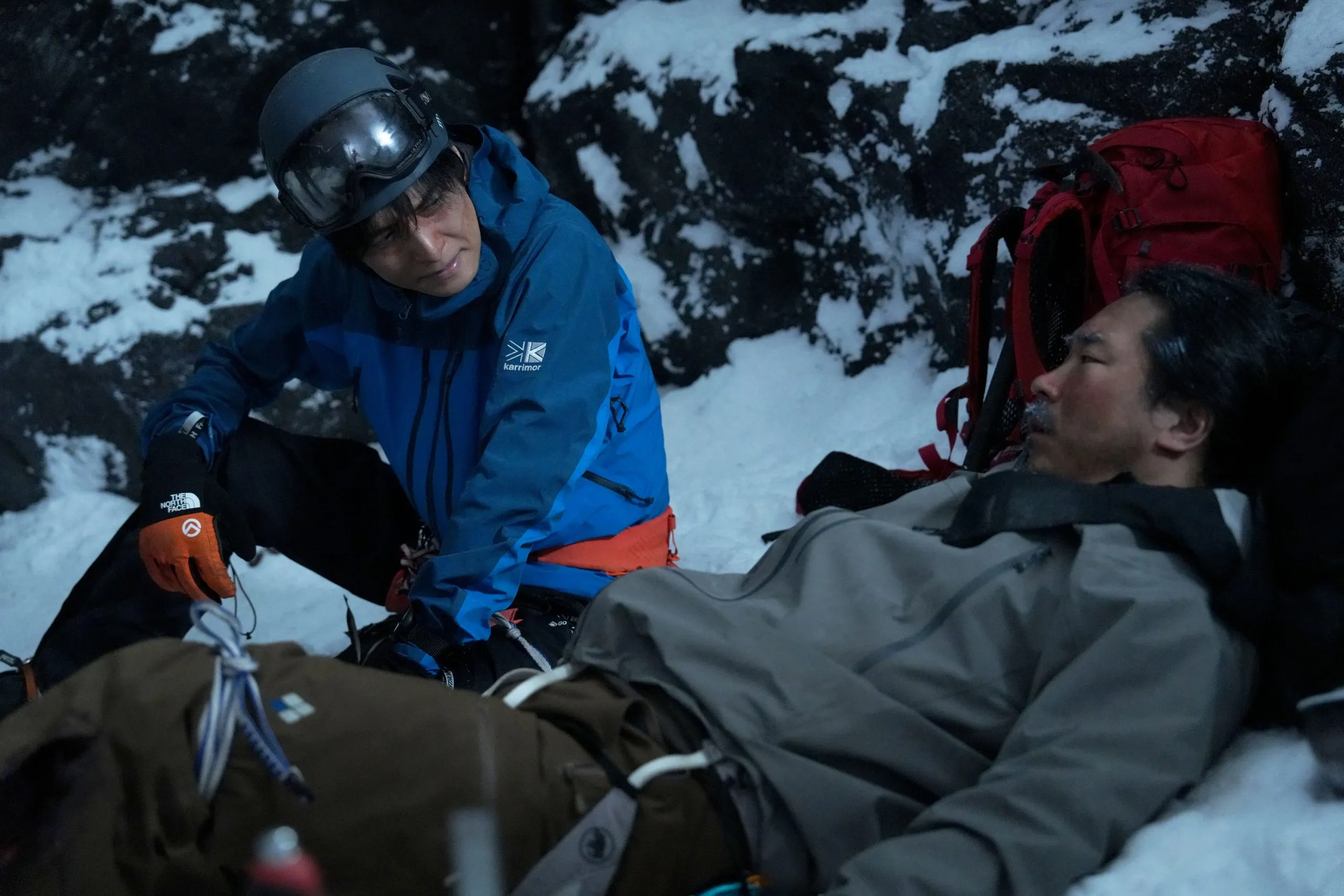Hidden within the towering peaks, deep in the whiteout of a raging blizzard, lies a traumatic secret that will be impossible to outrun. As the angry storm batters the isolated wilderness, it also stirs memories long buried and awakens a face from the past better left forgotten. Two veteran climbers find themselves trapped together in a remote refuge, their annual pilgrimage up the unforgiving slopes transformed into a desperate struggle to not only survive the elements but each other.
For over a decade, Asai and Jiyong have made the difficult ascent to honor their dearest friend Sayuri, who disappeared under mysterious circumstances on their final expedition as students. But this time the storm threatens to claim another life as Jiyong’s leg is badly injured, and in a moment of fearing his demise, he confesses to Asai a truth that forever alters the nature of their refuge.
With rescue now assured but justice also within reach, the tight confines of the rickety shelter become the stage for an escalating psychological showdown as each man fights for the upper hand, leading to violence fueled as much by exhaustion and isolation as past betrayals.
Through it all, Director Nobuhiro Yamashita maintains an atmosphere of intense claustrophobia and unease, trapping the audience as effectively as the pair are trapped within the decaying walls.
With minimal cast and setting, he wrings impressive suspense from basic ingredients and is guided by two compelling performers, transforming an expectedly straightforward scenario into a chilling tale of deception, diminishing trust, and the brutal acts we’re all capable of in humanity’s darkest moments of crisis. Above the howling winds, unanswered questions from long ago demand resolution, and in the closing hours until dawn, more than one life may hang in the balance.
Trapped in Tradition
The film wastes little time plunging us into its snow-swept setting. For over a decade, climbing partners Asai and Jiyong have made the somber pilgrimage up the dangerous slopes, honoring the memory of their dear friend Sayuri, who vanished without a trace during their college years. But this anniversary hike brings unforeseen peril, as without warning Jiyong’s leg is savagely broken in the treacherous conditions.
As death seems to beckon, Jiyong’s guilty conscience comes pouring out. Between pained gasps and panicked pleas for Asai to save himself, he confesses to the long-buried truth: it was he who killed Sayuri in a moment of twisted passion and jealousy. The admission hangs uneasily in the frigid air after the howling wind dies down, but then a ray of luck—only a short scramble away lies an abandoned hunting cabin.
Shelter and warmth are found within the dilapidated walls, yet tensions soon mount higher than the raging storm outside. Jiyong regretfully eyes the friend who now wields power over his ruined life, while Asai grapples with this shattering revelation and what justice may require. Their fragile trust splinters fully as suspicion sets in that Jiyong can’t risk leaving a living witness.
In the confined quarters, a physical altercation seems inevitable. Yamashita expertly plays on our uncertainty over reality, with Jiyong seemingly appearing and disappearing according to his own disturbed imagination. The climactic confrontation leaves more wounds than just the visible when dawn finally shakes the last flakes of snow from the eaves.
Some felt the plot twists went too far, and Sayuri’s role deserved richer context. Yet within its constraints, the film tells a viscerally human story of Folly’s long shadow and how even strong bonds can sour given the right poison. When crisis strikes two climbers trapped with a lifetime of hurt, there may be no escape from the raging tempests within.
Fractured Bonds
At the heart of Confession’s complexity lay its three main characters and unraveling relationships. Jiyong remains the film’s great enigma, a once-affable man forever altered by a single impulsive act years past.
As the twisted truth surfaces after so long buried, the outer friendly mask cracks to reveal the serrated edges of his deteriorating psyche. Did he really act out of selfish passion, or is there more to his obsession with Sayuri and jealousy of her bond with Asai?
Yang Ik-june masterfully portrays Jiyong’s spinning descent, flickering between pathetic weeping and frantic, empty smiles as the noose of his fate tightens. By the visceral climax, this tormented soul is but a husk of his former self, clinging to survival by fingernails amid the howling gales within and without.
Asai too has been bowed by time, though in less overt ways. For over a decade, he’s mourned a lost love in silence, unaware of the sinister hand in her fate. Toma Ikuta brings quiet gravity to a man now forced to excavate long-buried grief and confront violent truths about those closest to him. Through it all shines Asai’s basic hope for resolve, even as he’s whipped between vengeance and mercy.
Sayuri remains the knot at this trio’s heart, though frustratingly absent from the film besides fleeting visions. In truth, she feels more like a concept than a fully realized character, which limits understanding of events. A shame, as her spirit clearly still animates these men’s passions.
Time and again, Yamashita draws us into the texture of fractured bonds resurfacing after years under snow and ice. But with scant time to pick apart old scars and new wounds amid the pressing crisis, interactions overflow with meanings left begging for deeper dives. What depths of feeling may yet linger in Asai’s memories of Sayuri beyond pain? And where does Jiyong’s present fatefulness truly root—in obsession, or some remnant of care for these former comrades? Tantalizing threads, though within Confession’s taut frame only so far one can pull before the whole is unraveled.
Master of Manipulation
Yamashita proves himself a true maestro of manipulating the viewer’s psyche within Confession’s tight borders. From the intimate opening strains rising over the craggy peaks, he had us tightly in his grip.
Central to crafting the pervasive anxious tone is the sole claustrophobic setting, its peeling walls creeping ever closer as paranoia takes hold. Within this dilapidated shelter’s shrinking confines, no place feels safe from the next unseen terror.
Camerawork becomes another unhinged presence, lurching through crooked corridors and jerking around crumbling ceilings like the eyes of a man losing grip on reality. Sudden slashes of light and score erupt with a violence nearly equal to fists and blades. Through it all, the director holds us captive alongside his characters, never permitting a look behind the cabin’s splintering walls.
Between bouts of visceral brutality, Yamashita uses dreamlike phantoms and glimpses of figures vanishing around corners to amplify the fraying distinction between memory and madness. Are the haunting flashes of Sayuri mere tricks of the mind, or something more spectral stirring in this place? Impossible to discern in the pandemonium, we share in the mounting hysteria until the final shocking revelation.
Throughout, Kimura’s roving lens and Takumi’s ominous strains complete the fusion of art and atmosphere. Their macabre waltz sweeps us to the conclusion, by which point audience and characters alike have crossed beyond reason into realms where only instincts remain. In Confession, Yamashita proves a maestro of manipulating space, sound, and vision to heighten every chilling coup de grâce.
Shadows of the Past
Deeper than its surface scares, Confession uses taut suspense to shine light on heavier themes still haunting its characters. Chief among these is betrayal—the shattering impact on close bonds from even long-buried secrets. For Asai and Jiyong, their friendship’s grim fate stems from a loss of faith between former brothers in arms.
Yet the film suggests trust, once broken, can never fully mend. Only raw survival instincts remain in their warped game of lies and violence, the caring people they were drowned beneath rising tides of madness and deception. Here isolation plays its part, shattering morale as the mental strains of crisis wear down barriers between reality and memories better left interred.
Vengeance too becomes a theme, and whether resolving past wrongs through violence truly achieves justice or merely breeds more anger. Jiyong likely felt he was delivering fate’s judgment on Sayuri; does Asai now have the right to do the same? In the charged climax, moral codes disappear within the snow, the law of tooth and nail all that’s left.
Through it all, Confession portrays humanity at its frailest—how easily we revert to beast when stripped of society and support networks. Its confined world becomes not just a deadly playground but a microcosm, revealing primal drives that lurk in us all given the right threats and absence of community. Some scars, it shows, may never fully heal.
Mountains and Madness
While Confession steadily builds terror within its constrained borders, Yamashita’s tale does stumble slightly by the film’s end. The closing sequences feel over-egged, deploying plot twists that strain credulity and diminish the authentic desperation drawn so well until then.
A particular missed opportunity lies in Sayuri’s fleeting, underwritten appearances. So much pivots on this missing woman, yet she’s denied fullness, leaving gaps in understanding the trauma transforming two friends so violently against each other. With richer flashbacks exploring this fateful trio, the drama could have resonated more deeply.
Similarly, trimming a few minutes may have resulted in tauter storytelling. As it stands, some climactic beats outstay their welcome, coming off as padding what was expertly compelling until then.
However, these qualms should not overshadow Confession’s myriad successes. From opening frames, Yamashita’s skilled touch for suspense holds sway, trapping viewers as effectively as his characters trapped within decaying walls. Clever camerawork and production flourishes likewise elevate the claustrophobic atmosphere.
While not faultless, Confession undoubtedly achieves its primary aim—to convey simmering psychosis within an isolated winter hell. Yamashita proves himself a master of squeezing potent chills from basic ingredients. For thriller fans, its merits far outweigh brief shortcomings, making it worthy viewing when trapped by storm within your own four walls.
A Chilling Mountain Madness
While not flawless, Confession proves a solid thriller for any fan of the genre looking for spine-tingling suspense on a cold night indoors.
Yamashita demonstrates real talent, compressing an unsettling atmosphere and mesmerizing descent into hysteria within minimal time. Ikuta and Yang give committed performances that anchor the mounting tension until the final shocking moments.
To be fair, trimming just a few scenes or expanding Sayuri’s role could have resulted in higher praise. But Yamashita tells an undeniably compelling story of psychological fracture under duress. Even if not achieving perfection, Confession delivers visceral chills that linger long after the final frame.
Genre buffs will find much to appreciate—the claustrophobic setting exploited for all its dreadworth potential, the murky lines between reality and illusion, and how fragile human bonds rupture under stress. While not redefining thrillers, Confession offers a divertissement that entertains through its terror. For fans of productions like Buried testing mental limits within self-imposed confines, this remote refuge makes for an unsettling watch. When trapped by storm or in small quarters, Confession brings the howling blizzards within.
The Review
Kokuhaku Confession
Confession proves a compelling chamber thriller that squeezes maximum chills from minimal ingredients through a tense atmosphere and committed performances. Director Yamashita demonstrates skill in steadily ramping unease within a tightening claustrophobic vice. While not perfect, the film tells a haunting tale of friendship's fragility and humanity's breaking point. For fans of the genre, Confession's virtues outweigh minor flaws, making it worth enduring its harrowing frozen setting and mental torment.
PROS
- Tight pacing and structure for a thriller
- Atmospheric setting exploited effectively for suspense
- Strong performances anchoring the descending psychology
- Provokes thought on themes of trust, justice, and survival
CONS
- Underdeveloped, missing female character limits understanding.
- Some contrived climactic plot elements
- Could have benefited from minor trims or context additions





















































